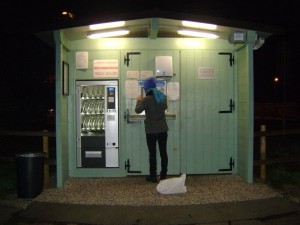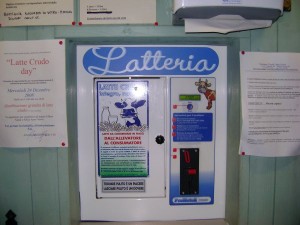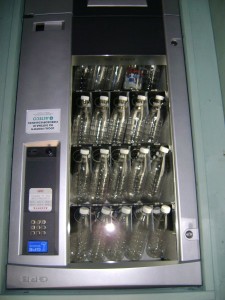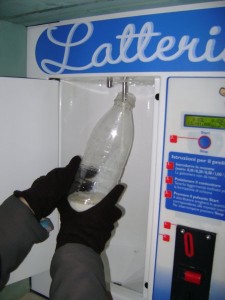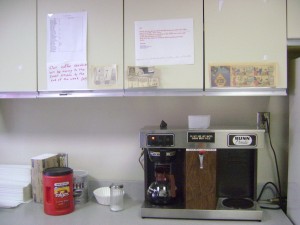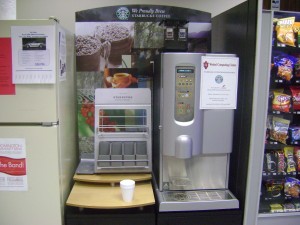The Allied Media Conference just released their website for the 2009 conference and opened up their session proposals. If you have a great idea for a session for the 2009 conference, you can share it on their Submit Sessions page.
Category: Uncategorized
Sundown Towns past and present
I’m in the process of reading the book Sundown Towns and I just started the chapter about “triggers”, or events that Whites used to rationalize running all the Black residents out of town.
I was just watching PBS’ Independent Lens when I saw this documentary about Tulia, Texas. The story sounded all too familiar …
monetizing music
The music industry is whack. We all know this, but as a person making DIY punk music it’s always hard to reason about making money from making music. Working a crappy (and moreover, undignified) job to support making records is something that is respected or revered. With many folks making music coming from college-educated backgrounds or middle-class economic situations with lots of community and family support, the reality is that people could easily transition from a life where they live at income levels below the poverty line and make music to a life where they work a dignified, or at least lucrative, job to support themselves. Are you flaunting your privelege by artificially living in poverty or by succumbing to an economic vision that doesn’t allow musicians to support themselves without all the cruft, exploitation, hype and wasteful promotion of the traditional record industry?
I don’t have the answers to this, but in his song Moment of Clarity, Jay-Z seems to have made his decision, at least in his completely different set of experiences in life and with the music industry:
The music business hate me
’cause the industry ain’t make me
Hustlers and boosters embrace me
And the music I be making
I dumb down for my audience
And double my dollars
They criticize me for it
Yet they all yell “Holla”
If skills sold
Truth be told
I’d probably be
Lyrically
Talib Kweli
Truthfully
I wanna rhyme like Common Sense
(But I did five Mil)
I ain’t been rhyming like Common since
When your sense got that much in common
And you been hosteling since
Your inception
Fuck perception
Go with what makes sense
Since
I know what I’m up against
We as rappers must decide what’s most important
And I can’t help the poor if I’m one of them
So I got rich and gave back
To me that’s the win, win
The next time you see the homie and his rims spin
Just know my mind is working just like them
(The rims that is)
Digital Barn Raising
I was recently asked to advise on the 2009 Allied Media Conference’s How-To Track (you can check the 2008 track out here) and I’m trying to think how to approach it. Watching teachers recently and thinking about the community organizing that’s happening here in Bloomington, a lot of the skills I want to know how-to do aren’t neccessarily technical. Still, my goal for this year’s AMC is to help create a track that not only builds and strengthens community and coalitions around consuming and discussing media but in it’s actual production – from editing videos, to making beats, to loading Linux on a server, to hacking together a Drupal module. These technical tasks are often done in solitude by a few individuals who have been delegated the task or who hold onto the skills and projects too tightly for more folks to be involved. I’ve always felt excited and empowered by technology, not just in what it can do, but in using and manipulating it.
Comment here if you have anything you’d like to see in a session at the conference or if you know of folks doing awesome stuff with technology and media to further social justice goals.
Family micro-lending in the U.S.?
The Northwest Airlines in-flight magazine has been a wealth of insight lately. I read that Berry Gordy started Motown Records in 1959 on an $800 loan from te Ber-berry Co Op, a fund which family members each paid in $10 every month in order to make loans to launch new family business ventures. With so many projects (and friends) being broke right now, I want to know how people are funding important work from their base. This seems like one cool model blasting from the past.
COMMUNITY MEETING AGAINST JAIL EXPANSION
INVITATION TO COMMUNITY MEETING AGAINST JAIL EXPANSION
SATURDAY, JANUARY 31, 3:00-6:00 p.m.
GREAT HALL, TRINITY CHURCH, 111 S. Grant St.
Childcare will be provided
Decarcerate Monroe County (DMC), with the encouragement of Citizens for Effective Justice, UU Friends of Prisoners Task Force, and New Leaf/New Life, is pleased to invite you to a community update and discussion on Monroe County’s plan to expand incarceration. Please come to share information and personal stories about incarceration, coordinate efforts to fight the expansion, and begin developing effective, long-term strategies and proposals to reduce incarceration!
BACKGROUND
In the fall of 2008, the Monroe County Criminal Justice Coordinating Council (MCCJCC) held a series of meetings ostensibly to solicit public input regarding the proposal to construct new criminal justice facilities, including a new youth lockup, to replace the current jail. The meetings gave criminal justice personnel opportunities to present their assessment of the current situation and to make their arguments in favor of the County’s plan for expansion. The final meeting offered a platform for the presentation of construction plans by the Noblesville-based design and construction contractor PMSI, Project Management Solutions Incorporated. Despite overwhelming opposition expressed in public comments, County officials seem to have emerged from the meetings with continued determination to pursue the expansion plan.
COMMUNITY MEETING
As an alternative and follow-up to this series of meetings, Decarcerate Monroe County has called a genuine public forum for Saturday, January 31st, in the Great Hall of Trinity Church. This afternoon will offer information, facilitate a broad-ranging public conversation, and plan continued active response. People should bring their experiences and ideas to contribute to working out practical solutions to the problems the jail purports to solve but actually only worsens.
WHAT IS DMC?
Decarcerate Monroe County is an open coalition that works to challenge the belief that cages, coercion, and confinement keep our community safe. DMC believes that people are safe when they have their basic needs met and when they feel empowered and free. DMC works to build access to meaningful, non-coercive options for dealing with problems and resolving conflict. We resist expansion of incarceration, including the proposed adult and youth jails; we support shrinking the existing punitive justice system in Monroe County.
While the group calling the meeting is explicitly against jail expansion, the Community Meeting will welcome the broadest array of opinions — please come and let’s all work together to make Monroe County a safer and more just place!
Stumbling upon media
I was reading an interview with someone and the interviewee mentioned that one thing that was lost in internet use is the experience that one has in the library of stumbling upon something unexpected and quite often unrelated to your query while searching the rows of shelves in a library. I had a similar experience with the radio the last time I drove back from Indy from a doctor’s appointment. I was scanning through the radio dial and found the Mo’Nique in the afternoon radio show and found it again today when I was driving to the airport. It was such a nice surprise to hear the call in show and all these different people’s voices, joking, and telling stories. It was a kind of communication that was mediated, for sure, by distance and technology, but it also felt rich, natural, and connected. I imagine people all over the country listening to the show and calling in while stuck in rush hour traffic which is usually such an isolating, dehumanizing experience. It was a nice surprise too since my idea of this kind of drive-time radio show, solidified in the many hours I spent listening to WINK 104 in Harrisburg when I was a kid, was always an abrasive, sexist, white, male, “shock jock”. It was nice to hear voices that were warm and nice but definitely not boring.
Yesterday, I went to see The Tale of Despereaux which was pretty disappointing. When the movie finished, I heard a chorus of young voices in the theatre not-quite-whisper, “the book was better”. More than that it’s frightening to think about how normalized gender roles (“every girl wants to be a princess”), violence against women, and ethnic stereotypes (in a world populated by rats and mice, guess which ones are Anglo, and which ones are vaguely Arab, not to mention the continued representation of French and Italian people as eccentrics who are only good at being goofy and good at cooking) become in media, especially for young people.
I think I’ve always been accused of picking things apart to the point of not being able to enjoy anything. And I wonder, am I just a hater whose cynicsm will just rub off on younger people so instead of enjoying something, in spite of its faults, they’re reminded how ugly and hopeless the world can be? The thing about being critical, though, about disecting the things that I hear or read or watch is that when I stumble upon that rare thing that doesn’t rely on the ugly, played-out stereotypes, that even after dissection still maintains some mystery and magic, it’s that much better for really knowing how rare it is.
Milk Machine
Gaza, reading, and one world, many people
I’ve been trying to make sense of everything going on in Gaza, all while traveling and getting bits and pieces of the story. This all the more difficult because in the last few months, I’ve seen a lot of media that reiterates the absolute horror of the Nazi German holocaust, and in the last week, picked up two books that Chiara had been reading: a little book about WWI and a book about Islam. The book about WWI, despite the authors enjoyment of the play-by-play excitement of the war, made me feel like the whole thing was started as a pissing contest for power and territory – absolutely ridiculous.   I learned that the origins of the state of Israel are with this war and the partitioning of conquered lands by various European colonial powers and it made it very easy to feel like peace was doomed from the start. The book of essays on Islam made me realize that the faith and culture of Islam and the politics of the Middle East are so much more complicated, rich, and nuanced than what I had known through my education through the U.S. media. Aside on the importance of teaching: I never learned about Islam, or the Middle East, for that matter, in school. Even during the first Gulf War. It is crazy for me, and likely a whole generation of people my age, to be so ignorant of something so pivitol in the world.
This article, Why Gaza Matters To Us, has been filtering through my social network, and I like this snippet at the end:
As people of color who have our own various histories of resisting the erasure of our cultures from this planet against the spread of military-corporate assimilation, we must stand with the Palestinians, speak out, and take action. The anger and mourning we feel should drive us to break the cycle of domination vs. extinction. Fear, including the righteous fears of Jewish people who want to exist, and the righteous fears of Palestinians that they will be relegated to life in a walled prison and never allowed to be home – these fears are not going to create a world in which peace is possible. We must approach the Israeli people as brothers and sisters who have gone astray in the wake of their own trauma, help them to clean the blood from their hands, and come home to the human family.
I have a harder time with the article included at the end, David Lloyd’s Gaza and the Ghetto. I think that the thought experiment of imagining Nazi Germany in the place of Israel and Palestinians in the place of Polish Jews is an accurate analogy, but it continues to frame the current conflict in terms of the Holocaust, which is the problem with the analysis of too many attrocities whether they’re in Palestine, Rwanda, or elsewhere in the world. State repression, genocide, and people losing their dignity and safety is unacceptable in it’s own right, anywhere, at any time. Framing things, especially Israel vs. Palestine within the Holocaust traps everyone in a hopeless argument of who has had things worse. This is a string of analysis that is easy to get caught in and to which many, many people can add their own legitimate weight, but that ultimately seems to trap everyone. Watching children squabble, it seems like the same argument, though with much lower stakes. Someone else always started it, making retaliation, even if it’s something that you wouldn’t want inflicted on you, justifiable. As I child, I was often told, “life isn’t fair,” which was always unsatisfying, and lacking much empathy at that age, it as hard to see that life was not only unfair, but also mutually unfair. I think the more truthful, and hopeful life lesson is that life isn’t just unless you make it that way and that retaliation, and rationalizing it, is not the same as justice. I want to try to read One Country in the hopes that it offers some way out of the cycle of trying to define who is the most attrocious or victimized and instead figure out how to define the things that everyone wants, safety and dignity among them, concretely, and how to get there. The question of how to achieve one country for two peoples isn’t just crucial to Palestine and Israel. From what I’ve read so far of The Accidental American, to the recent U.S. presidential election (and prop 8), to Chiara comenting on the changing cultural landscape (even at street level) of Italy, to the crazy internal conflicts within arbitrarily drawn nations and conquered empires that were at the heart of the world wars (maybe most wars?), to my own personal experience, the idea that we can or should live in a world with segregated identities or interests is both impossible and undesireable. I am absolutely convinced that conservatives who want to preserve a culturally and ideologically segregated world are less than wrong, they’re irrelevant. Still, I think that radicals who imagine a world without these borders can’t hope for justice without acknowledging cultural and ideological boundries and the people ensnared in them. The question for me becomes how to acknowledge people’s experience and the perception that it creates without succumbing to the morasse of ethical relitivism.
Out With the Old …
and in with the new …
What’s the word that means the opposite of panacea? There must be such a word, but I don’t know what it is. If ever there was something that was seen as a symbol for everything that was bad about the expansion of corporations and the power of global capital, Starbucks would be it. Hating on Starbucks as the great satan of the coffee world seems so 1998, especially if one thinks about the differences in wages and benefits for Starbucks workers versus many independent coffee shops and the differences in “diversity” between the work forces. At the very least, things are more complicated when it comes to coffee shops or globalization.
Still, it seemed like the punchline to a tasteless joke when I saw the worker-run, communal coffee service at my work banished to the smaller, further kitchen and replaced with the sparkling Starbucks-branded machine. Great. Starbucks wasn’t satisfied with having a presence on every other street corner in some major metroplolitan areas, rapidly gentrifying neighborhoods, and interstate exits, it had to squeeze into my job’s break area too. If I don’t fall back on portraying Starbucks as the totally evil corporate monster, it’s not quite as easy to explain what’s wrong with the coffee giant, but the machine’s arrival bothered me somehow.
I think that what I don’t like about the machine, and the chain in general, is that it erodes a community’s (whether a workplace or a neighborhood) immagination and sense or responsibility. With the collective system, people had to figure out how to negotiate machine ettiquete, what kind of coffee to buy, how much to charge per cup, what to do with any profits, and what to do about delinquent users. Even if someone coordinated the system, I think that there was at least a sense that the existence of the system was dependent on some consideration of these questions and a certain amount of responsibility for maintaining the flow of coffee at the offices. These aren’t hugely important questions, I know, but it’s easy to see how these could be seen as a microcosm of the bigger considerations of a community. With the new machine, you just pay your money and that’s it. If it doesn’t work, someone else will come fix it, or maybe they won’t. If the prices seem too high, you just have to deal with it. Who knows where the profits go. Maybe if the machine doesn’t make enough money, it will go away, but to buy or not to buy and cup size are about the extent of the choices. This doesn’t exactly empower a great deal of positive coffee stewardship.
Thinking about the implications of brick and mortar coffee shops, I recall an independant coffee shop that I once visited, and really liked, in another city. It was in a largely Latino neighborhood that was struggling with gentrification within the city’s long history of racial segregation. On the wall of the coffee shop was a clipping of a news article about the neighborhood entrepreneur who opened the shop. In the article, he said:
“When I came in, there was a lot of old-fashioned-thinking people who thought I would never make it,” says Mr. Delgado, 36. “But I saw an unmet need in the community for a place where people could come and hang out. Just because you’re Latino doesn’t mean you have to eat tacos every day. We needed a cafe.”
If, instead of this coffee shop, a Starbucks had opened up in this neighborhood, it probably wouldn’t have explicitely challenged this assumption, both internally and externally about Latinos. In so many places, I perceive Starbucks as a marker of gentrification, something comforting to outsiders coming into the neighborhood and something unused and hostile to some long-term residents. Instead, a coffee shop might act as a so often absent middle ground where creative-class newcomers, long-term resident coffee drinkers, and those who defy the stereotypes of coffee shop patron that, at least for me, still revolve around the cursed Friends sitcom, all find some sense of investment. A shared space to drink coffee won’t solve the problem of gentricication, but it seems so hard to find other foundations for dialog or accountability.
A sense that a business is accountable and malleable to a community is so important. Otherwise, tough questions about economics and social responsibility get reduced to “should I stay or should I go” as was the case with neighborhood “save our Starbucks” campaigns when the company recently cut the number of franchises or the fate of the “too big to fail” auto industry. That simplification, and the accompanying sense of things that severely impact lots of people being totally out of their hands, might actually qualify as that thing that is the opposite of a panacea, whatever the proper word is.
On a somewhat related note, I’ve been in Italy for almost 3 weeks and have drank a lot of coffee. I have yet to see a Starbucks, or even a to-go cup of coffee. It seems that most people get their coffee from one of the “bars” that seem so ubiquitous. People either sit or stand at a table or a counter, but it’s nice to see drinking coffee as a real break and social activity instead of a fillup. I haven’t been able to perceive much difference between the quality of the places I’ve been too, but I appreciate the little differences that come with independently owned places – the decor, slight differences in the menu, and the idiosyncracies of the proprieters. I really like the cast of regulars that trickle in and the longstanding repoir they seem to have with the folks behind the counter. Maybe this is how it feels for people who frequent their nearest Starbucks, but it’s hard to imagine it being the same. It’s the difference between feeling that twinge of propriety over something in your corner of the world and things being made the same, everywhere.

